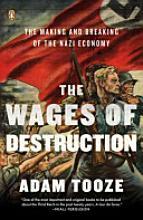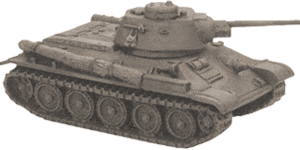The Wages of Destruction

Reviewed by Steven Douglas Mercatante [1]
Adam Tooze's The Wages of Destruction: The Making and Breaking of the Nazi Economy is an extraordinary piece of scholarship and for years to come will no doubt be regarded as essential reading for anyone seeking a greater understanding into Germany's Second World War economy. Tooze's work comprehensively breaks down the how and why of Hitler's quest to establish a German empire in Europe and the role economics played in German defeat. Remarkably, Tooze accomplishes this by largely avoiding any discussion of the European war's operational military history and instead by focusing upon the economic and ideological decisions driving Hitler's war. Tooze weaves together a number of themes in this groundbreaking work and demolishes long standing myths that have come to define World War II's European Theater. Tooze both enlightens and entertains; The Wages of Destruction: The Making and Breaking of the Nazi Economy is well written and in spite of its length easily holds the reader's attention. The scope covered by Tooze's work is truly breathtaking. Rather than chronologically describing the book's flow - as it covers the bulk of Germany's economic history as relevant to the Second World War - I will instead mention some of the most important ideas advanced within its' pages.
First, Tooze demonstrates that Hitler and the National Socialist regime had a clear ideological and economic focus driving the German war effort. This is important, because frequently the economic component of the Third Reich's war is in particular singled out as nothing more than irrational and chaotic - arguments conclusively proven false in The Wages of Destruction: The Making and Breaking of the Nazi Economy. Without giving away the entire game, suffice it to say Tooze amply demonstrates how and why Hitler and the National Socialists made a push for great power status by creating a continental empire with the capacity to ultimately challenge the continental economic colossus that was and is the United States of America. In short, Hitler's focus was on Eastern Europe and establishing the lebensraum, or living space, necessary for Germany to become a true superpower. Of particular interest is in Tooze's demonstration of the importance agrarian policy played in not only National Socialist economics but also the Holocaust and even greater genocide planned for Eastern Europe - leading to the second great theme of the book; its description of the Holocaust and genocide as economically motivated as much as ideologically and racially motivated.
In terms of debunking long standing myths, the economic component behind the subsequent Holocaust and genocide is absolutely crucial in proving the complicity with which top National Socialist economic leaders were not merely "technocrats" but willing participants in some of the most horrible crimes ever committed against humanity. Albert Speer, among others, comes in for some deservedly rough treatment here and not only for his role in the Holocaust, a role he had mostly successfully denied in the sixty years since the War ended, but also because of bit of myth busting performed by The Wages of Destruction: The Making and Breaking of the Nazi Economy. Tooze makes clear Speer, for all his postwar accolades, was something less than the maestro of the "economic miracle" he supposedly engineered late in the war; when Germany cranked out munitions in quantities far exceeding those achieved prior to 1943 and did so even as Germany came under heavier and heavier bombardment and had its access to important raw materials diminish exponentially. I will leave the true reason for Germany's impressive late war economic output to the interested reader.
There is far more within The Wages of Destruction than what is briefly mentioned in this review that will prove revealing and insightful to even the serious student of World War II. Moreover, although Tooze's examination of the Nazi economy is not all encompassing; at one point even he admits the mechanics and structure of the National Socialist coal and steel industries remain poorly understood - the overall outcome of Tooze's research is overwhelmingly authoritative and insightful. Even though I would not start with this book if I were seeking to learn a basic overview of the Second World War I would have no qualms about opening it after I have learned the basics. Far too often the military and political-strategic part of the equation receives the brunt of scholars and researchers efforts in explaining the War - in exploring the economic history of the Third Reich The Wages of Destruction: The Making and Breaking of the Nazi Economy richly fills a
gaping hole in the historical record.
1.Steven Douglas Mercatante's Why Germany Nearly Won, A New History of the Second World War in Europe, is currently scheduled for publication by ABC-CLIO's Praeger early in 2012. Why Germany Nearly Won not only explores how close Germany actually came to winning the Second World War, but also why Germany was defeated. This work stems from over two decades researching and studying the Second World War. Steven's writing in the historical field goes beyond his research, and draws upon his experience as a former history teacher, from his undergraduate studies in history at the University of Michigan, from his graduate work in history at Eastern Michigan University, and from his study of International Law at Michigan State University College of Law. Steven has been published numerous times over in the historical and financial/legal field, both online and in a scholarly journal with a 2008 article entitled; The Deregulation of Usury Ceilings, Rise of Easy Credit, and Increasing Consumer Debt, published in volume 53 of the South Dakota Law Review.



Post new comment